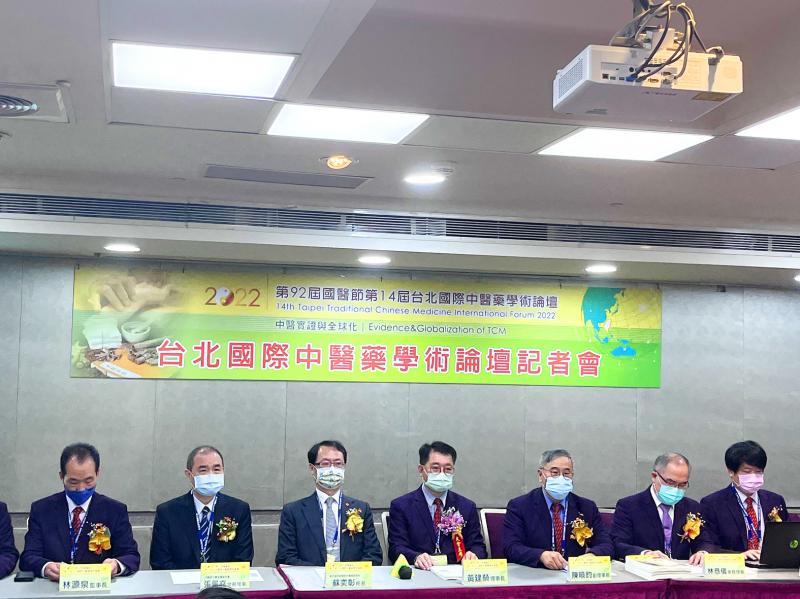A Chinese medicine-based herbal formula developed in Taiwan called Taiwan Chingguan Erhau (清冠二號), or NRICM102, could reduce the mortality rate of COVID-19 cases who experience severe symptoms by 50 percent, National Research Institute of Chinese Medicine (NRICM) director Su Yi-chang (蘇奕彰) said.
Su talked about the treatment on Sunday at the Taipei Traditional Chinese Medicine International Forum, saying that following the success of Taiwan Chingguan Yihau (清冠一號), or NRICM101, the institute is applying for patents and trademarks for the new formulation.
In 2020, permission was granted to export Taiwan Chingguan Yihau, and it has been sold in more than 50 countries with positive responses from overseas, Su said.

Photo: Tsai Si-pei, Taipei Times
Taiwan Chingguan Yihau received emergency use authorization in May last year from the Ministry of Health and Welfare, which allowed it to be manufactured and used for clinical treatment in Taiwan.
Eight pharmaceutical companies have authorization to manufacture the formula.
Taiwan Chingguan Erhau is a modification of its predecessor, which includes indigowoad root, heartleaf houttuynia herb and scutellaria root, among others, Su said.
Ingredients “helpful in fighting viruses” and “regulating the immune system” remain in Taiwan Chingguan Erhau, while stronger substances that “help bolster health maintenance” were substituted for those with modest effects, he added.
Clinical trials of Taiwan Chingguan Yihau were conducted from May to August last year in 15 hospitals including the Tri-Service General Hospital, Taipei Hospital and Taoyuan General Hospital.
Results showed that the chance of people with COVID-19 developing severe symptoms was reduced by 80 percent if they were using the formula, Su said.
Over the same period, more than 100 cases with severe symptoms received Taiwan Chingguan Erhau in clinical trials, with results suggesting a 50 percent drop in mortality rate within 30 days, he said.
Asking pharmaceutical companies to target only COVID-19 cases with severe symptoms is impractical as the pandemic wanes, Su said, adding that the institute plans to test Taiwan Chingguan Erhau’s usefulness against other severe lung diseases.
The formula’s effectiveness in treating chronic obstructive pulmonary disease, cardiac and pulmonary arrest, and pulmonary embolism are being assessed, he said.
Su also said that unlike Western medicines that target one disease, a Chinese medical formula can usually treat many diseases.
Taking Chinese medicine is unlikely to produce side effects or develop resistance the same way drugs or antibiotics do, he said.
Su said that the institute plans to approach companies that are interested in manufacturing Taiwan Chingguan Erhau and follow the procedures for launching new medical treatments in Taiwan.

Taiwanese can file complaints with the Tourism Administration to report travel agencies if their activities caused termination of a person’s citizenship, Mainland Affairs Council Minister Chiu Chui-cheng (邱垂正) said yesterday, after a podcaster highlighted a case in which a person’s citizenship was canceled for receiving a single-use Chinese passport to enter Russia. The council is aware of incidents in which people who signed up through Chinese travel agencies for tours of Russia were told they could obtain Russian visas and fast-track border clearance, Chiu told reporters on the sidelines of an event in Taipei. However, the travel agencies actually applied

New measures aimed at making Taiwan more attractive to foreign professionals came into effect this month, the National Development Council said yesterday. Among the changes, international students at Taiwanese universities would be able to work in Taiwan without a work permit in the two years after they graduate, explainer materials provided by the council said. In addition, foreign nationals who graduated from one of the world’s top 200 universities within the past five years can also apply for a two-year open work permit. Previously, those graduates would have needed to apply for a work permit using point-based criteria or have a Taiwanese company

The Shilin District Prosecutors’ Office yesterday indicted two Taiwanese and issued a wanted notice for Pete Liu (劉作虎), founder of Shenzhen-based smartphone manufacturer OnePlus Technology Co (萬普拉斯科技), for allegedly contravening the Act Governing Relations Between the People of the Taiwan Area and the Mainland Area (臺灣地區與大陸地區人民關係條例) by poaching 70 engineers in Taiwan. Liu allegedly traveled to Taiwan at the end of 2014 and met with a Taiwanese man surnamed Lin (林) to discuss establishing a mobile software research and development (R&D) team in Taiwan, prosecutors said. Without approval from the government, Lin, following Liu’s instructions, recruited more than 70 software

Chinese spouse and influencer Guan Guan’s (關關) residency permit has been revoked for repeatedly posting pro-China videos that threaten national security, the National Immigration Agency confirmed today. Guan Guan has said many controversial statements in her videos posted to Douyin (抖音), including “the red flag will soon be painted all over Taiwan” and “Taiwan is an inseparable part of China,” and expressing hope for expedited reunification. The agency last year received multiple reports alleging that Guan Guan had advocated for armed reunification. After verifying the reports, the agency last month issued a notice requiring her to appear and explain her actions. Guan